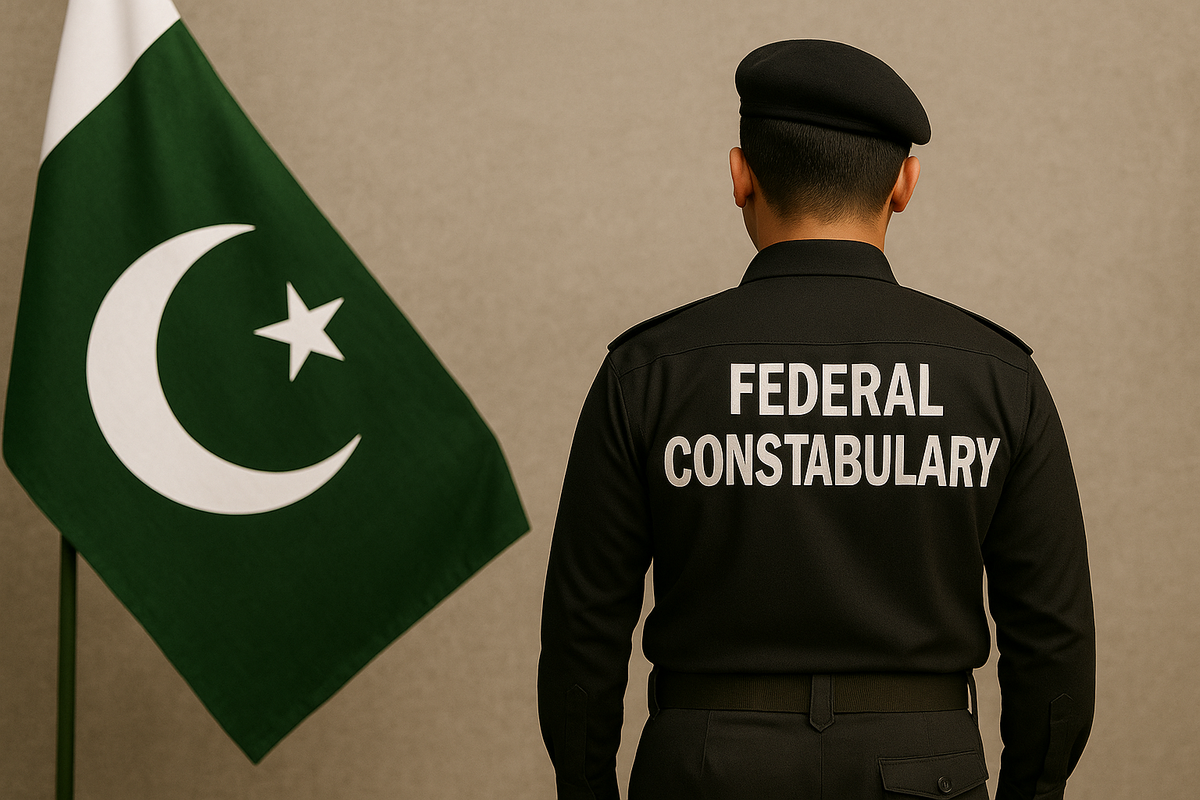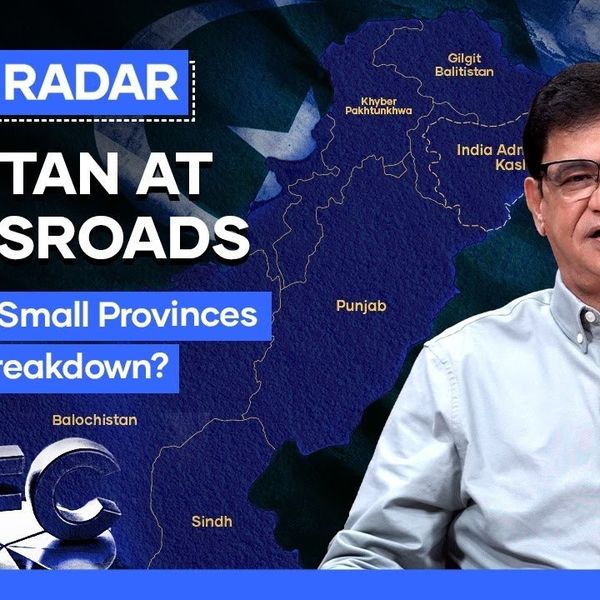Will Pakistan’s new Federal Constabulary strengthen security or silence dissent?
Unlike the Frontier Constabulary’s limited regional role, the new FC has a nationwide mandate and broader powers

Aamir Abbasi
Editor, Islamabad
Aamir; a journalist with 15 years of experience, working in Newspaper, TV and Digital Media. Worked in Field, covered Big Legal Constitutional and Political Events in Pakistan since 2009 with Pakistan’s Top Media Organizations. Graduate of Quaid I Azam University Islamabad.

A representative image of a Federal Constabulary officer in Pakistan.
AI generated
With the stroke of a presidential pen, Pakistan now has a new national security force -- the Federal Constabulary. But as questions swirl over its sweeping powers and timing, many are asking: is this about national security or political control?
In a sudden move, the president of Pakistan has signed an ordinance establishing the Federal Constabulary (FC) -- a new countrywide paramilitary force operating under the direct command of the federal government.
Unlike the Frontier Constabulary, which has long operated in border regions and tribal belts, the new FC has a nationwide mandate and a significantly expanded operational structure.
According to the ordinance, the force will be headed by an Inspector General (IG) appointed by the federal government. Structured into multiple divisions and wings, the FC will assist civilian law enforcement, paramilitary outfits, and intelligence services across the country.
This restructuring comes at a politically sensitive time. As Pakistan braces for a protest campaign led by the opposition Pakistan Tehreek-e-Insaf (PTI) and its jailed leader Imran Khan, the federal government has enacted one of the most sweeping changes in law enforcement in recent memory. Through a presidential ordinance, the historically provincial Frontier Constabulary has been rebranded and expanded into a nationwide force under centralized control.
While the government frames the move as a long-overdue administrative overhaul, critics warn it could become a potent tool for political enforcement at a time of rising dissent.
Institutional necessity or centralized muscle?
Officials describe the change as part of the Frontier Constabulary (Re-organization) Ordinance, 2025. The stated aim: to standardize operations, extend jurisdiction, and improve the welfare of FC personnel -- many of whom have served in dangerous conditions with little institutional recognition.
Speaking to Nukta, State Minister for Interior Talal Chaudhry emphasized that the revamped FC is not to be confused with the federal police. Instead, he described it as an “institutional necessity” to streamline law enforcement across provinces and deliver long-needed reforms.
However, many observers view it differently, arguing the restructuring reflects a calculated effort to centralize authority at a time when political tensions are already running high.
Structural details spark concern
Under the ordinance, the Federal Constabulary will report to a federally appointed Inspector General, assisted by Additional IGs and Deputy IGs. The force will consist of two major divisions:
- The Security Division, comprising the existing FC structure; and
- The Federal Reserve Division, a new wing functioning as a full-scale national police force.
This new force will include officers at all ranks -- SPs, ASPs, DSPs, Inspectors, Sub-Inspectors, and ASIs -- and will be tasked with anti-riot and special protection duties.
Recruitment will be spread across the country:
- 20% each from Punjab, Sindh, Balochistan, and Khyber Pakhtunkhwa,
- 10% from Azad Jammu and Kashmir,
- 6% from Gilgit-Baltistan, and
- 4% from Islamabad.
But critics argue the structure reveals more than just an administrative realignment.
Sections of the ordinance raise particular alarm.
- Section 12 gives the FC powers to arrest and transfer individuals to other agencies.
- Section 14 grants it nationwide operational jurisdiction under the Criminal Procedure Code, Anti-Terrorism Act, or any federal directive.
- Section 15 provides full legal protection for all official actions taken under these provisions.
Expanded mandate raises eyebrows
With centralized funding, recruitment, and operational control, the FC now holds formal jurisdiction across all provinces, Azad Kashmir, and Gilgit-Baltistan. The newly created anti-riot wing will be equipped with modern training and tools for crowd control and civil unrest.
Former Khyber Pakhtunkhwa IG Ehsan Ghani told Nukta that while the FC has operated in various regions for decades, this restructuring is a “game-changer.”
“Security forces in this region have often been used as political instruments,” he said. “This move gives the FC a mandate to act anywhere, potentially overriding provincial police forces—especially during political unrest.”
Ghani also noted that Pakistan already has 17 law enforcement agencies with overlapping roles. “Instead of fixing inefficiencies, we often create new forces to justify budgets or assert political dominance.”
He warned that past friction between FC units and local police illustrates the dangers of parallel command structures.
Section 12: A flashpoint in the debate
Legal experts see Section 12 as particularly controversial. One senior lawyer, speaking anonymously, called it a direct intrusion into provincial jurisdiction.
“This isn’t just a technical change -- it’s a tool that could be used to bypass local police and target political activists, especially in sensitive areas like Khyber Pakhtunkhwa,” they said.
They added that the powers granted contradict the spirit of the 18th Constitutional Amendment, which devolved law enforcement to the provinces. “When security forces are used for political coercion, the line between governance and repression gets dangerously blurred.”
Echoes of the FSF
The FC’s transformation also revives memories of the Federal Security Force (FSF), created in 1972 by Prime Minister Zulfikar Ali Bhutto. Originally intended to protect state assets and assist police, the FSF was soon accused of acting as a political enforcer.
Following Bhutto’s ouster in the 1977 military coup, FSF officers testified against him in a murder trial that led to his execution. The force was later disbanded.
Experts warn that the unchecked authority and centralized control of the new FC echo the FSF’s troubling legacy. Without oversight and safeguards, the risk of repeating history remains real.
Reform or risk?
Former FC and KP police chief Malik Naveed offered a more measured view. He acknowledged that the FC’s tribal-based, colonial-era structure had long required reform.
“Debates around riot control and counterterrorism roles have been going on for years, especially during the peak of militancy,” he said. “A specialized, well-resourced unit can be a step forward.”
Still, Naveed warned that Pakistan’s politically volatile landscape demands careful implementation.
“The Police Order 2002 aimed to give police operational autonomy, but enforcement has always lagged. Even well-intentioned reforms can become controversial without proper checks.”
The FC, once rooted in tribal loyalty from Wazir, Dawar, and Yousafzai communities, is now part of a centralized framework -- a structural and symbolic shift that could reshape Pakistan’s internal security landscape for years to come.










Comments
See what people are discussing